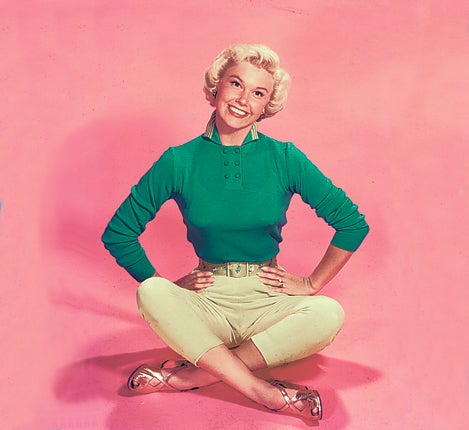Cut Doris Day some slack for ‘forgetting’ her real age
If today’s Hollywood actresses complain about the pressure to stay ageless and the lack of meaningful female roles post-35, then imagine Doris Day in 1962


Doris Day, in keeping with her sunny Fifties movie persona, has been terribly jolly about her “Birthday Surprise” from the Ohio Associated Press. Day, it transpires, is not celebrating her 93rd birthday today as fans may have thought. She is 95. For many, many decades Doris Day has been trimming a little excess slack off her real age. But, as Morrissey from The Smiths once said about white lies: “There is always someone, somewhere, with a big nose, who knows.”
And Day’s game is up. Her birth certificate has been located. “I have never paid much attention to birthdays,” the star responded in good humour, “but it’s great to finally know how old I really am!” Day’s representatives say the mistake probably happened years ago when she was auditioning for a role and was simply never corrected.
Personally, I’d have responded to the journalist with a chucked shoe and a string of expletives quite out of kilter with a twinkly-eyed nonagenarian. If I was 95, having lived with that “misunderstanding” for so long, I wouldn’t thank any young, sharp-elbowed thing hoping to win a humorous headline out of my supposed vanity. Associated Press could take that birth certificate, roll it up and shove it somewhere tight and dark. There has to be some high-points to extreme ageing, and I intend “suffering fools very badly” to be my raison d'être.
Tripping Doris Day up on her actual age, in 2017, feels crass. It also makes no allowance for the difficult era in which she thrived. If today’s Hollywood actresses complain about the pressure to stay ageless and the lack of meaningful female roles post-35, then imagine Doris Day in 1962, aged 38 (cough), playing the love interest of Cary Grant in That Touch of Mink. Day was at this point one of the only female leading box-office stars. But while Cary Grant, Clark Gable, Rex Harrison and her other co-stars, all much older than her, were maturing like fine wines and enjoying roles as heroes, villains, professors, judges and general avuncular presence, Doris Day, on the other hand, must have known her limitations.
I can’t blame Day for not shouting up, at the height of her fame, that the world had her age wrong. She must have known that logically, her time in the spotlight was running out. Younger things with smoother skin would play the ageing Rex Harrison’s girlfriend. The best thing a 45-year-old female film star looked forward to in the 1960s was 10 years in the showbiz wilderness, then a possible return playing a supporting role of a crazed spinster or an interfering mother-in-law. Day made her final movie in 1968. She played a widow with three sons in a comedy about finding a new husband.
Whether anything has changed in recent years regarding female actors and ageing is debatable. Lisa Kurdrow’s excellent HBO bittersweet mockumentary The Comeback tells the story of Valerie Cherish, a former A-list actress. We watch through our hands as Cherish finally accepts that in middle age, post-40, her only concrete TV offer is playing a frumpy landlady, lurking bitterly on the sidelines of younger women’s fun. We wince as she accepts that there’s no need for her to attempt sexiness, in fact her costume is a flammable shell suit. She is screen parsley. No-one would care if she was missing from the plate.
It often feels like the entertainment industry rewards Meryl Streep, aged 67, so often and so loudly chiefly because of how damn hard it is to have pulled of being Meryl Streep. Streep kept on plodding defiantly in the Eighties after her youthful years in The French Lieutenant’s Woman, Sophie’s Choice and Out of Africa. She refused to go away as those offers became Death Becomes Her or The River Wild, where she played “the mother of children on a white-water rafting trip”. It is a very rare and hard-nosed path which leads a female actor like Streep back to lead roles playing Thatcher or Pankhurst, or to her accepting the Cecil B DeMille Award Lifetime Achievement at the Golden Globes. As audiences, we have only recently begun to question where all the good female actors go. If Doris Day’s tactic, back in the Fifties and Sixties, was to gently forget she was the age she was, I think we can cut her some slack.


Join our commenting forum
Join thought-provoking conversations, follow other Independent readers and see their replies